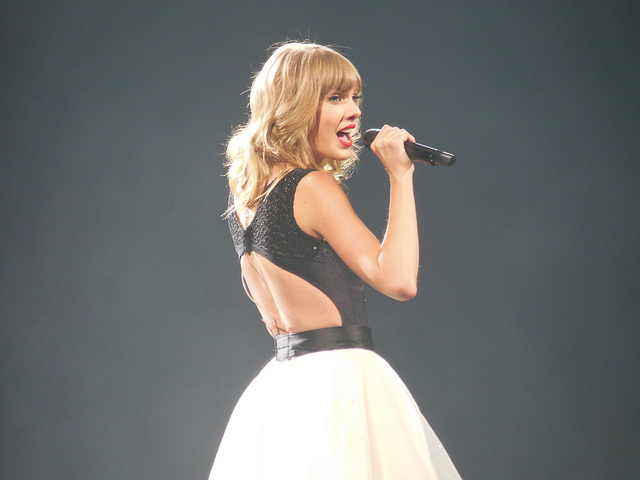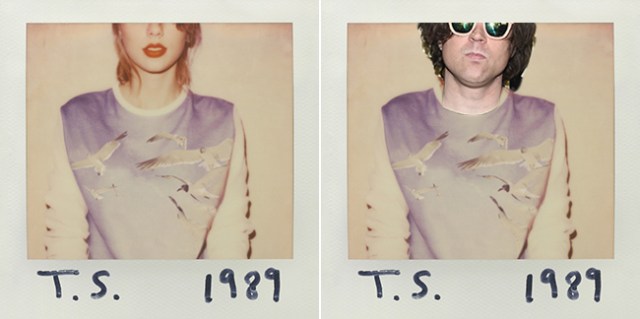Taylor Swift and Ryan Adams: Respect for the Feminine

Pop music – despite being, you know, popular – has a bad rep. Adjectives like “fluffy” or “unsubstantial” get bandied about, and sometimes, it is. Not every song has to be an in-depth examination of anything. Sometimes, you just wanna shake your shit and dance. But if you actually listen to the lyrics behind the poppin’ dance beat, you’ll actually hear some real emotions and thoughts being expressed. Sometimes, I have the feeling that the reason pop music is so easily dismissed is because, like “chick lit,” it’s predominantly consumed by women.
On Sunday, indie rocker Ryan Adams released his highly-anticipated album, 1989, on which he not only covers, but re-arranges all the tracks on Taylor Swift’s hit album of the same name. The album was not only highly-anticipated by curious fans, but by Swift herself, who’s been hyping the release, and been re-tweeting fan reactions:
Soooooon… #ryanadams1989 pic.twitter.com/6p0cWe6qUV
— Taylor Swift (@taylorswift13) September 20, 2015
As Adams was doing press for the release yesterday, he did an interview on Beats 1 Radio with Zane Lowe on which Swift made an appearance. It seems she loved both the concept and the execution of the album. Meanwhile, Adams has a huge amount of respect for Swift, which is why he chose to do her album in the first place, and has nothing but wonderful things to say about her talent and contributions to the music industry. They’ve written together before as well, so they clearly respect each other enough to work together (even though the song they wrote together never ended up appearing on an album), and can speak knowledgeably about each other’s process. They even discussed possibly performing together at some point.
So, why does media feel the need to not only compare the albums (which makes sense, as one is an adaptation of the other), but cater to the notion that Adams’ contribution is obviously elevating “superficial” source material?
Take Uproxx’s comparison of the two albums, for instance: while they acknowledge that “of course, these are Swift’s songs in the first place, so there’d be no Ryan Adams version if not for her”, and “Perhaps more importantly, though, this project shows what a strong songwriter Swift is” they’re gearing their commentary to an audience that would of course assume that Swift=fluff and Adams=substance. Why? Because he always sounds sad and plays slow songs on a guitar?
The Guardian calls out the problem in their side-by-side comparison of the album:
Ever since late 90s UK sap-rock afterthoughts Travis covered Britney’s “… Baby One More Time” on Radio 1 in 1999, it’s become more and more commonplace for indie artists to “put their own spin” on a pop song. That’s fine, each to their own etc, but it’s usually the reason behind the cover version that can be galling. “We listened to the song and actually, surprisingly, it does have depth to it,” they’ll say before adding, “so we’ve stripped out all the fun stuff so you can hear the words.” The patronising assumption is that the pop listener can’t feel an emotional connection to a song if it doesn’t have guitars on it; that a pop song’s brilliant longing can’t be communicated unless the voice delivering it is grizzled and has been recorded using two tin cans and a bit of string.
Amen, Guardian.
What’s disturbing and disappointing to me is that, whether supporting it, or arguing against it, comparisons of the album in media have felt the need to, in some way, comment on the idea of Swift’s music being “fluff.” There’s this need for any “respectable” publication to acknowledge that they understand that Swift’s music might not be taken seriously, but…
And as a long-time fan of pop music, I hate that this idea even exists. And it doesn’t only exist in music. As I mentioned before, “chick lit” as well as the romance genre and a lot of manga often have trouble being taken seriously, because feminine concerns are never seen as Important as masculine ones. Books about war, or politics (typically considered “masculine topics” despite the fact that women have always had a vested interest in those things) are considered Serious Literature, while books about love, or family (typically considered “feminine topics” despite the fact that, you know, plenty of men fall in love and want/have families and, like, came from a mom and whatnot) are considered less Important.
And when listening to music, or reading a book, or watching a film about love or family, the gender of the creator often determines how Seriously that work is taken. A book/film/song about love or family written by a woman is often seen as “superficial” or “fluffy.” After all, that’s all women do, right? Is worry about falling in love and having babies? So what insights could they possibly share that are relatable? Meanwhile, when a man writes about these things, it’s considered Revolutionary and insightful – because men so rarely write about those things, so when they do, they get doggie biscuits and pats on the head for acknowledging that they have feelings.
If only that worked the other way around. If only a woman writing about war or politics were taken as seriously as a male creator. But it’s more likely that it would be seen as an inferior effort. After all, what do women know about important topics like war, or politics?
Pop music is often seen as inferior, because the female perspective, and a feminine sensibility aren’t valued. Teenage girls are said to “ruin” conventions because of their interest in Twilight or The Hunger Games. Pop musicians like Taylor Swift are dismissed as “superficial.”
It’s too bad that, for many, Swift’s strengths as a songwriter are only apparent, because they’ll only really sit down and listen to a man singing those words.
(via Time, Image via Jana Beamer on Flickr)
—Please make note of The Mary Sue’s general comment policy.—
Do you follow The Mary Sue on Twitter, Facebook, Tumblr, Pinterest, & Google +?
Have a tip we should know? [email protected]
